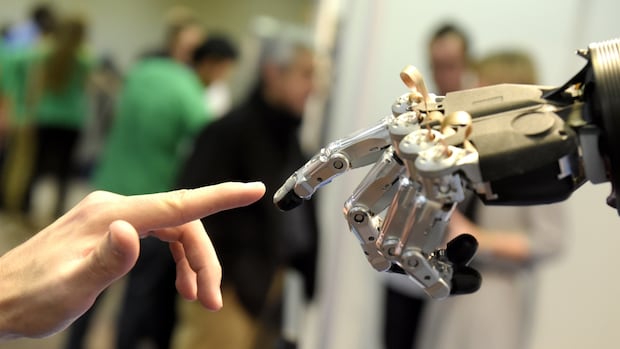The Current22:28How near death experiences change your look at work and life
Singer-songwriter Aysanabee was snowshoeing across a frozen lake in remote northern Ontario over a decade ago, when the ice gave way beneath him, plunging him into frigid waters.
“I could like feel the icy water filling up my snow pants and I knew I couldn’t swim with the snowshoes — and all these different things are running through my mind,” said Aysanabee, who is Oji-Cree, Sucker Clan of the Sandy Lake First Nation.
“I just thought, ‘Wow, this is it, this is it for me and I haven’t done anything with my life,” he told The Current’s Matt Galloway.
Aysanabee is now an award-winning musician, but at the time he was 19 and working for a mining company, playing music in bars in his spare time. It was around -40C on that early January day, and the young man was alone, more than six hours outside Ear Falls, Ont.
But Aysanabee had managed to fall slightly forward as the ice broke, allowing him to sink an axe into the ice shelf. As he struggled to drag himself out, one swing of the axe at a time, he frantically bargained with “whoever was listening … a higher power or something.”
“If I get out of this, I promise … I will do this thing, I’ll go play music,” he remembers pledging.
He eventually managed to pull himself back onto solid ground, where he started a small fire to warm up and dry off. On the long walk back to camp, he had time to reflect on how close he came to death — and what he wanted to do with this second chance.
“Then, three months later, I bought a one-way ticket to Toronto to go do music,” he said.
At the University of Guelph, Jamie Gruman and his research team recently interviewed 14 people who suffered near-death experiences, examining the impact on their work and careers. Published in the Journal of Management, Spirituality and Religion in April, their research showed that survivors gained new insights, from a greater interest in spirituality to a belief that everyone is born equal, and here for a reason.
“Specifically as a result of those things, the insights and the personal transformations, work often became much less important to people,” said Gruman, a professor of organizational behaviour at Guelph University.
“They thought, ‘Well, why am I doing this? Like, what’s the point? Is this meaningful? Does it matter?'” he said.
WATCH | Aysanabee performs Near to Death, a song inspired by his experience:
In the years since he fell through the ice, Aysanabee has released two critically acclaimed albums. He’s been nominated for the Polaris Music Prize and took home two awards at the 2024 Junos, including Songwriter of the Year.
Looking back at his younger self, he says he always knew he wanted to be a musician, but didn’t know “how to do it.” He credits what happened with giving him the courage to pursue that dream.
“I think that whole experience definitely made me realize how precious time is,” he said.
“I don’t want to waste any of it, you know, wondering, ‘What if?'”
Workers ‘lost interest’ in money
Gruman said that what people want from their work boils down to three things: economic security, meaningful work that allows them to grow and develop, and high-quality relationships.
But for the study participants who had come close to death, that changed.
“They all completely lost interest in making money and any external measures of success,” he said.
“They didn’t want big houses and cars and boats. They didn’t want to be the executive vice president. They didn’t want to get rich.”
By contrast, the desire for meaningful work and strong workplace relationships skyrocketed, he said. That led some participants to change jobs, or even completely change careers.
Others were able to find what they needed by rethinking how they approached their work, Gruman said, giving the example of a teacher who “didn’t really like teaching.”
After her near-death experience, “she considered herself now to be a teacher in the school of life,” he said.
“Teaching math and science was just incidental to teaching students about the importance of treating people well and living well.”

Like Aysanabee, a brush with death taught the participants a lesson about time.
“They decided, ‘Look, you know, my time here is limited, so let me make a move. And do something that speaks to my soul,'” Gruman said.
Listen to your gut, says career coach
Career counsellor Stephanie Koonar says there are lots of reasons people can be dissatisfied with their work, but you don’t necessarily need a life-or-death experience to make a change.
“A lot of it is about being in touch with your own gut instincts,” said Koonar, Vancouver-based co-founder of PeerSpectives Consulting, which offers career coaching and leadership development.
“My husband calls it the toothbrush challenge: in the morning when you’re brushing your teeth, are you excited to go to work?”
Koonar helps people dig into those feelings with the Japanese concept of ikigai, which involves asking yourself four questions:
- What do I love?
- What am I good at?
- What does the world need?
- What can I be paid for?
She said the responses can offer clues to what matters most to someone, but it doesn’t always mean completely changing your career to get involved with something important to you.
“Maybe you’re an accountant or maybe you do website development or social media but you could … seek out those organizations that are working on issues and challenges that you think are important and bring your skills and talents to them,” she said.
She added that bosses and managers also have a role to play.
“Nowadays people don’t want a boss; they want a coach,” she said.
“That includes helping them course correct if they’ve made some mistakes … [but also] spotting their strengths and talents and then maybe giving them opportunities.”

Ultimately, Koonar says that being happy every day at work might not be the goal.
“Happiness is fleeting and at the end of our lives we are looking for more meaning,” she said.
“[That] might be bringing your talents and your strengths to a challenge. It may not even make you feel happy all the time … but it’s rewarding because you’re making a difference.”
For researcher Gruman, the lesson is to focus on what matters in your work life, both in terms of your own well-being and the people you build work relationships with.
“When you meet your maker, at the end of days, you can look back on your life and say, ‘Yeah, in that blink of an eye, that moment of time that I had to be alive, I made a difference,'” he said.






